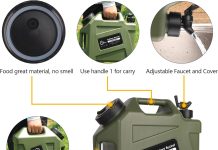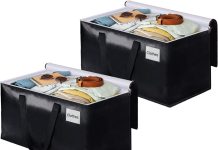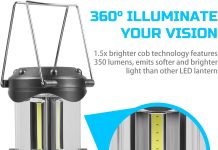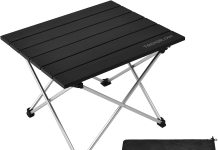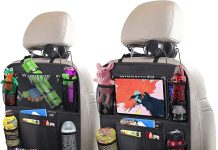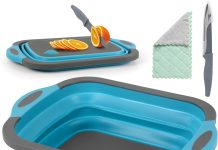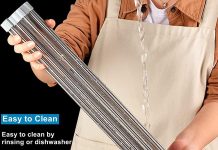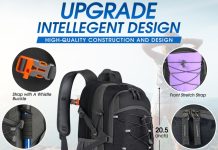Camping is an exhilarating adventure that allows us to reconnect with nature and create lasting memories with loved ones. However, choosing the right camping gear can be daunting for beginners.
With an overwhelming array of equipment and accessories available, it’s important to know which items are essential to ensure a comfortable and enjoyable outdoor experience.
In this article, we will explore some must-have camping gear items for beginners, helping you make informed decisions and embark on your camping journey with confidence.
Review contents
Shelter
Camping is all about immersing ourselves in nature and disconnecting from the busy world around us. Having the right camping gear is essential to enjoy our outdoor adventure fully. One of the most crucial items to consider is our shelter. After a long day exploring, whether hiking through the wilderness or canoeing down a river, having a cozy and secure place to rest is imperative for recharging our energy. One of the most popular and versatile options is a tent.
Tent
When it comes to camping, a tent is our home away from home. It protects us from the elements, privacy, and comfort in the great outdoors. Choosing a tent that suits our needs and the camping conditions we’ll encounter is essential. A basic tent with easy setup and good ventilation is ideal for beginners. Look for a tent that is made from durable materials and has a rainfly to provide extra waterproofing.
Sleeping Bag
A good night’s sleep is necessary to enjoy our camping experience fully. Investing in a high-quality sleeping bag is essential to stay warm and comfortable during the night. Consider the temperature rating, size, weight, and insulation type when choosing a sleeping bag. Synthetic insulation is popular for beginners as it is affordable, quick-drying, and insulates well even when wet. Down insulation, although more expensive, offers excellent warmth-to-weight ratio and packability.
Sleeping Pad
To enhance our sleeping comfort and insulation against the cold ground, a sleeping pad is a must-have item for campers. Whether it’s an inflatable pad or a foam pad, having that extra cushioning beneath us can make all the difference in getting a good night’s sleep. Inflatable pads provide more comfort and insulation, while foam pads are durable, lightweight, and often more affordable. Whichever option we choose, consider factors such as comfort, insulation, weight, and packability.
Cooking
Camping is not only about exploring nature but also about enjoying delicious meals under the open sky. Therefore, having the right cooking gear is crucial for a satisfying and enjoyable camping experience. Here are a few essentials to consider for our camping kitchen setup.
Camp Stove
A reliable camp stove is a game-changer when preparing hot meals while camping. There are various types of camping stoves available, from compact backpacking stoves to larger two-burner models for family camping trips. Consider factors such as fuel type (propane, butane, or liquid fuel), ease of use, stability, and cooking power. Look for a stove that is easy to ignite, has adjustable heat control, and is compatible with the cookware we plan to use.
Cookware
Choosing the right cookware for camping is essential to ensure efficient and enjoyable cooking. Lightweight and durable materials like aluminum or stainless steel are popular choices. A basic set of cookware usually includes a pot or two, a frying pan, and a kettle. Look for cookware with a non-stick coating to make cooking and cleaning easier. Additionally, consider the size of the cookware and its compatibility with our camp stove.
Utensils
Having the proper utensils can make cooking and eating a breeze while camping. A set of camping utensils usually includes a knife, fork, spoon, and sometimes a spatula and tongs. Look for utensils that are made from durable materials like stainless steel and have a compact and lightweight design for easy packing. Some camping utensil sets also come with a convenient carrying case, making them easy to store and transport.
Fire Starters
Creating a warm and cozy campfire is essential for providing heat, cooking meals, and enjoying the camping experience. To successfully start a fire, it’s essential to have reliable fire starters on hand.
Lighter
A simple but essential tool for starting a fire is a reliable lighter. Invest in a weatherproof lighter that is designed for outdoor use. Look for one with an intense flame, and consider carrying a backup lighter in emergencies. Remember to keep your lighter in a dry and accessible place to ensure it remains functional when needed.
Waterproof Matches
When starting a fire, waterproof matches are a reliable alternative to lighters. These matches are designed to withstand moisture, making them useful in wet conditions. Carry a waterproof match case to keep them dry and safe from the elements. It’s also a good practice to bring along a small container of strike-anywhere matches as a backup.
Fire Starters
When natural tinder, such as dry leaves or twigs, is scarce, having fire starters can significantly simplify starting a fire. Fire starters, such as fire-starting sticks or cubes, are designed to ignite easily and burn for an extended period, giving us enough time to establish a sustainable fire. Keep a few fire starters in your camping gear to ensure you’re prepared in case of wet weather or a lack of dry kindling.
Navigation
Exploring the great outdoors means venturing into unfamiliar territories and navigating nature’s wonders. Having reliable navigation tools is essential to avoid getting lost and make the most of our outdoor experience.
Compass
A compass is an invaluable tool for outdoor navigation. Whether we’re hiking, backpacking, or simply exploring, a compass can help us find our bearings and stay on the right path. In conjunction with a map, a compass allows us to navigate accurately, even when electronic devices fail or batteries run out. Learning how to read a compass and understand basic navigation principles is a valuable skill for any beginner camper.
Map
A paper map is a classic navigation tool that should not be overlooked, even in this age of GPS devices and smartphone apps. A detailed and accurate map of the area we plan to explore is essential for route planning, identifying landmarks, and understanding the terrain. Invest in a waterproof and tear-resistant map, and make sure you know how to read it and interpret the various symbols and markings.
GPS Device
While traditional navigation tools like a compass and map are reliable, technology has also provided us with advanced options. Global Positioning System (GPS) devices can be beneficial for precise navigation. These devices use satellite signals to determine our exact location, elevation, and speed. Consider a handheld GPS device that is rugged, waterproof, and equipped with features such as preloaded maps and waypoint navigation. Don’t forget to carry spare batteries or a portable charger to ensure uninterrupted usage.
Clothing and Footwear
When venturing into the great outdoors, having appropriate clothing and footwear is crucial for comfort, safety, and protection against the elements. Here are some essentials to consider when packing for a camping trip.
Layered Clothing
Layering is a fundamental principle when it comes to dressing for outdoor activities. We can quickly adapt to changing weather conditions by wearing multiple layers and regulating our body temperature. The three main layers to consider are base layer, insulation layer, and outer layer. A moisture-wicking base layer helps keep us dry by moving moisture away from our skin, while an insulating layer traps heat to keep us warm. The outer layer, often a waterproof and breathable shell, protects us from wind, rain, and snow.
Hiking Boots
A comfortable pair of hiking boots is one of the most crucial investments for any outdoor enthusiast. Look for boots that offer ankle support, a sturdy outsole for traction, and good waterproofing. Fit is essential, so try a few pairs to find the right size and width for your feet. Before your trip, break in your hiking boots to avoid blisters and discomfort on the trails.
Rain Gear
Even during the sunniest of camping trips, unexpected rain showers can occur. Being prepared with proper rain gear is essential to stay dry and comfortable. Invest in a waterproof and breathable rain jacket to keep the rain out while allowing moisture to escape. Pair it with waterproof rain pants to ensure complete protection. Pack a lightweight and compact rain cover for your backpack to keep your gear dry.
First Aid Kit
Accidents and injuries can happen even outdoors, making a first aid kit an essential camping gear item. It’s important to be prepared to handle minor medical emergencies and provide primary care until professional help is available.
Bandages
A variety of bandages, such as adhesive bandages, gauze pads, and adhesive tape, should be included in a comprehensive first aid kit. These can be used for minor cuts, abrasions, and blisters. Make sure the bandages are sterile and individually packaged to maintain cleanliness.
Antiseptic Wipes
Antiseptic wipes are essential for cleaning wounds and preventing infection. They are convenient, easy to use, and should be readily available in any first aid kit. Look for wipes that are individually wrapped to ensure they stay sterile until needed.
Pain Relievers
Pain relievers like acetaminophen or ibuprofen can help manage minor aches, pains, and headaches while camping. Including these over-the-counter medications in our first aid kit can provide much-needed relief when discomfort arises.
Hydration
Staying adequately hydrated is vital during any outdoor adventure. Carrying the proper water storage and purification gear ensures we have access to clean drinking water throughout our camping trip.
Water Bottles
Having reliable water bottles is essential for staying hydrated on the trails. Look for lightweight, durable, and BPA-free options that withstand outdoor conditions. Consider the capacity of the water bottle depending on how accessible water sources will be during your camping trip.
Water Filtration System
In areas where natural water sources are available, a water filtration system is crucial for obtaining safe and drinkable water. There are various options available, including pump filters, gravity filters, and squeeze filters. Choose a filtration system that suits your needs, considering factors such as ease of use, speed, and the waterborne contaminants it can remove.
Water Purification Tablets
Water purification tablets are a reliable backup option when there is no access to clean water sources. These small, dissolvable tablets kill bacteria, viruses, and protozoa, making drinking water safe. Keep a supply of water purification tablets in your camping gear as a lightweight and compact solution for emergencies.
Lighting
Proper lighting is essential for navigating your campsite, setting up tents, and being able to see in the dark. Here are a few essential lighting options to consider when camping.
Headlamp
A headlamp is a versatile and hands-free lighting solution every camper should have. It lets us have a focused beam of light wherever we look, leaving our hands free to perform tasks. Look for a headlamp with different brightness settings, a comfortable headband, and a long battery life. Carrying spare batteries’s also a good idea to ensure you won’t be left in the dark.
Flashlight
While a headlamp is ideal for close-up tasks, a flashlight is essential for illuminating larger areas or signaling for help. Choose a compact and durable flashlight that provides a good balance between brightness and battery life. Look for additional features like adjustable focus or a strobe mode. Remember to pack spare batteries to avoid being left without light.
Extra Batteries
No matter how reliable our lighting gear may be, it’s always wise to have extra batteries on hand. Pack the appropriate types and sizes for your headlamp and flashlight. Keeping a small stash of spare batteries in a waterproof container will ensure that any unexpected power drain can be quickly resolved.
Safety
While camping is generally a safe activity, preparing for unexpected situations or emergencies is essential. A few safety items should be included in every camper’s gear.
First Aid Kit
We’ve already discussed the importance of a first aid kit, but it’s worth reiterating. A well-stocked first aid kit is an essential item for any camping trip. From treating minor scrapes to managing more severe injuries, having the appropriate medical supplies can make all the difference. Ensure your kit includes adhesive bandages, antiseptic wipes, pain relievers, and any necessary personal medications.
Whistle
A whistle is a compact and lightweight item that can be a lifesaver in an emergency. It can be used to attract attention or signal for help if we find ourselves in a dangerous or distressing situation. Attach a whistle to your backpack or keep it easily accessible in a pocket.
Multi-Tool
A multi-tool is a versatile tool that combines various functions in one compact device. It typically includes knives, pliers, screwdrivers, and more. Having a multi-tool in your camping gear allows you to tackle various tasks and make quick repairs on the fly. Look for a sturdy and reliable multi-tool that suits your specific needs.
Personal Hygiene
Maintaining personal hygiene while camping is essential for our comfort and overall health. Here are a few hygiene items that should be included in your camping checklist.
Toilet Paper
Even when camping in designated campgrounds, access to toilet facilities may be limited or far from our campsite. Carrying a toilet paper roll in your camping gear ensures you’re prepared for these situations. Opt for a compact, waterproof container to keep it dry and easily transportable.
Soap
Keeping our hands clean is crucial for preventing the spread of germs and maintaining good hygiene. Pack a small container of biodegradable soap for washing hands, face, and any dishes you need to clean. Look for soap that is environmentally friendly and safe for outdoor use.
Hand Sanitizer
Hand sanitizer is an excellent backup option when soap and water are not readily available. It can effectively kill germs and bacteria, keeping our hands clean even without running water. Carry a small bottle of hand sanitizer in your camping gear for convenient and quick hand hygiene.
With these essential camping gear items, beginners can confidently embark on their outdoor adventures, knowing they have the tools to enjoy and embrace the camping experience fully. Remember, preparation is the key to a successful and enjoyable camping trip. So, pack your gear, embrace nature, and embark on your next camping adventure with a smile!



